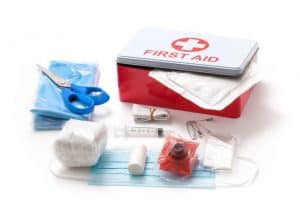Let’s be real clear about one thing – self-defense has a very precise definition within the legal system, and you need to understand your rights. It is also about much more than just knowing how to throw a punch or shoot a gun.
However, when you’ve exhausted all other options a physical confrontation may be necessary.
The main issue here is that people are either not trained properly or are trained to fight rather than defend themselves – and these two are very different things. You must understand that there are different levels of force you can use. Each level is appropriate for a certain situation, but either inadequate or overkill in otIt’s a good idea to plan for extreme scenarios, like surviving in the woods, a riot or disaster, but we are exposed to a lot of danger in our day-to-day lives as well. Preparing for urban survival means being ready to deal with all the common threats that are most likely to occur in a typical city.
To stay safe in the concrete jungle, you’ll need to master these five essential skills.
Tactical Awareness
Most people tend to go about their day locked into their thoughts and we barely notice what’s happening around us. You’ll hear “it all happened so fast” or “he just came out of nowhere” on police reports, but a mugger or active shooter don’t just materialize out of thin air.
The most important urban survival skill you can hone is awareness of your surroundings. This includes several things:
- Understanding the common dangers and threats – there are areas where you are more likely to get attacked, crimes that are more frequent than others and circumstances in which conflict turns into assault or murder.
- Knowing how criminals think and the tactics they use – read up on the criminal mindset and how criminals set up attacks so that you know what to look out for and how to stay safe.
- Opening your eyes and ears when you’re out of the house – turn around to scan the area before unlocking your car or getting money from the ATM, be mindful of people around you, throw a quick glance at the dimly lit corners and bushes, and don’t stare at your phone while walking.
- Having an escape plan – even the best plans can fall apart and you’ll need a good bug out strategy for those worst-case scenarios.
- Avoiding high-risk routes and situations – avoid dimly lit streets, bars at the edge of the bad part of town, arguing with shady-looking characters and getting so drunk you can barely stand.
- Looking for subtle signs of trouble brewing – there’s a certain “script” for most human behaviors, a clear beginning, escalation, and climax. If you learn to recognize the initial stages of behaviors leading to disaster, you can either nip things in the bud through conversation, make a distraction, or leave.
With a bit of practice, you’ll be able to notice danger signs well in advance and avoid putting yourself in high-risk situations. You don’t need to become a special forces operator, simply being aware of your surroundings and common threats will help keep you out of harm’s way.
First Aid

I’m always amazed when I see self-defense “experts” spend an hour talking about knife techniques and throws and not once mention some basic ways to actually treat a wound. You’re far more likely to experience a car accident, a fall or work-related cuts and bruises than a more extreme urban survival scenario.
And even if the worst should happen, basic first aid skills are far more useful for keeping people alive than boxing or knife-fighting skills. Organizations like the Red Cross offer excellent first aid training, which is the most efficient and affordable way to increase your chances of survival in most emergency situations.
Defensive Driving
Like it or not, we spend a good part of our lives driving around town in cars. Not only are we exposed to the risk of car accidents, but we also have to worry about mugging, carjacking, and stalking. And yet, very few people know how to drive properly, let alone use evasive tactics in high-stress situations.
The easiest solution to all these problems is a defensive driving course. Once you’ve learned a few advanced driving techniques you will be much safer on the road and ready to evade stalkers and violent criminals.
Conflict Resolution
Be it a dispute with an agitated patron at a local McDonald’s, an encounter with a drunk and aggressive thug at a bar, or an argument over supplies in a survival scenario, you need good conflict resolution skills to keep things from getting out of hand.
Spotting trouble well in advance and avoiding it is the preferred strategy, but sometimes you just can’t avoid it. This is why you should know how to talk to people who are angry or anxious and calm them down or at least avoid making matters worse.
The ability to keep yourself calm under pressure and influence others to do the same is an invaluable tool, but it takes time to develop. Work on this every day; trust me, there will be plenty of opportunities your skills.
Basic Physical Self-Defense
Here’s a rundown of a few effective types of technique for different levels of force:
- Low-level (light takedown, restraint and pain compliance) – for agitated or drunk people (family, friends or strangers) who are being verbally abusive and are getting physical, i.e. shoving people or pulling them by the hand.
- Mid-level (leg kick, hard takedown, choke hold) – for people who are getting physical and working themselves up for more violence, i.e. grabbing by the neck, pulling hair, twisting arm, slapping, screaming.
- High-level (power punch on the chin or solar plexus, groin kick, hard throw, wall slam, choke out) – for aggressive attackers intent on harming you, i.e. throwing punches, trying to throw or choke you, reaching for a weapon.
- Deadly force (weapon use or severe physical force) – someone has a weapon and is coming for or several people are attacking you, and you feel you are in imminent danger of great bodily injury or death.
Find two useful techniques for each threat level and practices them over and over daily until they feel natural and efficient.
Keeping yourself and those you love safe in an urban environment is all about preparation. Once you know what to look out for and how to deal with it, you’ll only need to hone a few useful skills to stay out of trouble.
